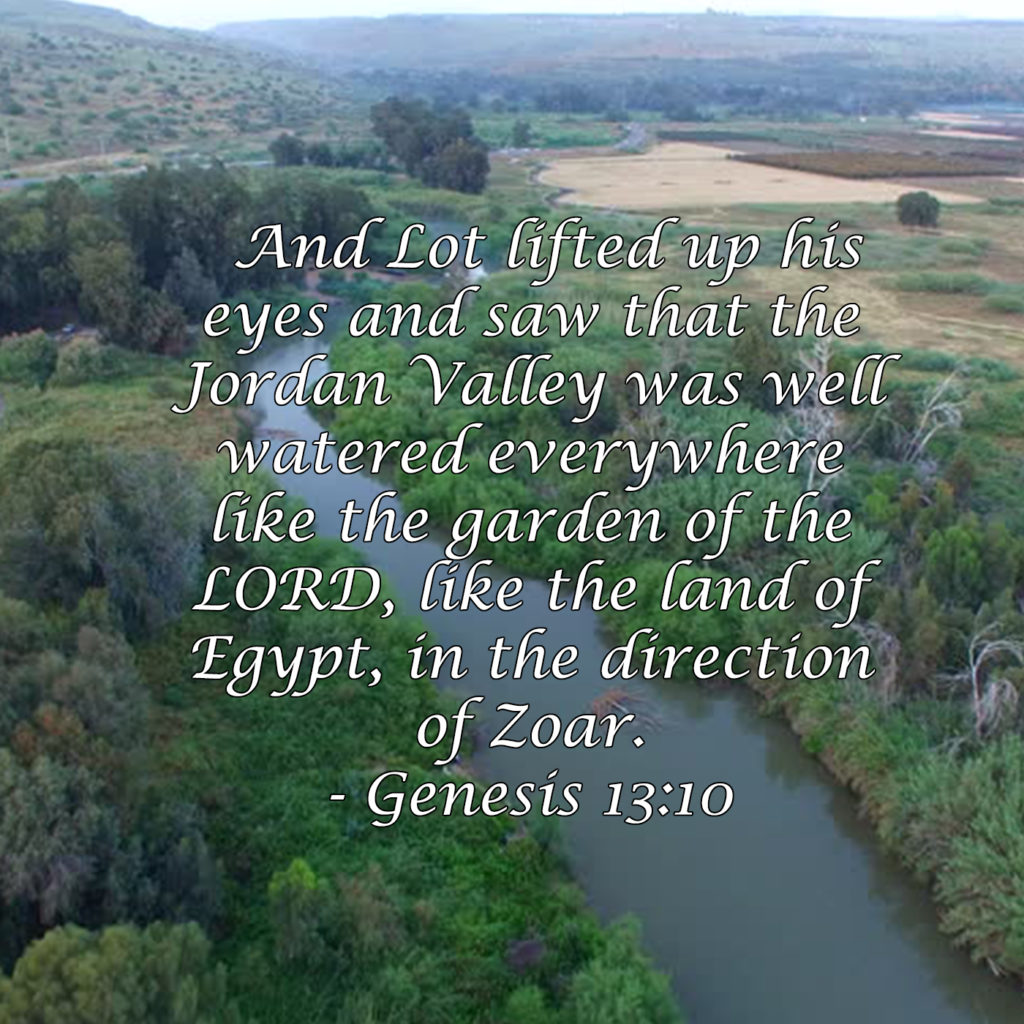
1 So Abram went up from Egypt, he and his wife and all that he had, and Lot with him, into the Negeb.
After being ordered to leave Egypt, Abram, Sarai, and Lot, return to Canaan. The text is not clear if there is still a severe famine, although that may explain the coming conflict between Abram and Lot.
2 Now Abram was very rich in livestock, in silver, and in gold.
While Abram had a comfortable life with livestock and servants prior to this, now he is considered very wealthy, mostly due to his dealings with Pharaoh in the previous chapter.
3 And he journeyed on from the Negeb as far as Bethel to the place where his tent had been at the beginning, between Bethel and Ai, 4 to the place where he had made an altar at the first. And there Abram called upon the name of the LORD.
Abram and his family eventually return to where they had been living prior to the trip to Egypt. They are now past the Negev Desert, and back in hospitable lands.
Upon returning, Abram calls upon the Lord. The sense of the verb “called” here is one that is repetitive, suggesting Abram made a habit of calling on the name of the Lord as part of his worship.
5 And Lot, who went with Abram, also had flocks and herds and tents, 6 so that the land could not support both of them dwelling together; for their possessions were so great that they could not dwell together, 7 and there was strife between the herdsmen of Abram’s livestock and the herdsmen of Lot’s livestock. At that time the Canaanites and the Perizzites were dwelling in the land.
Lot also benefitted from the trip to Egypt. With both Abram and Lot having such great belongings, there simply wasn’t enough room between Bethel and Ai for them both to keep their large flocks, especially if one considers that the land recently experienced a famine. Add in the Canaanites and Perizzites, two other people groups in the area, and there is the concern that such a large grouping of flocks could be attacked. Rather than work together, there appears to be a dispute between Abram’s servant and Lot’s servants, most likely about trying to find enough ground to graze their flocks without angering their neighbors.
8 Then Abram said to Lot, “Let there be no strife between you and me, and between your herdsmen and my herdsmen, for we are kinsmen. 9 Is not the whole land before you? Separate yourself from me. If you take the left hand, then I will go to the right, or if you take the right hand, then I will go to the left.”
To solve this conflict, Abram suggests that he and Lot separate. This is Abram’s suggestion, not Lot’s. Lot probably sees Abram as a father figure of sorts, and wouldn’t nessicarally want to leave.
To help ensure a smooth departure Abram does something that few men in his position would do: he offers Lot the choice of the land. In those days the elder always had the choice, and would often demand it. However, Abram in humility, offers that choice to Lot, knowing that Lot will likely take the better land for himself.
10 And Lot lifted up his eyes and saw that the Jordan Valley was well watered everywhere like the garden of the LORD, like the land of Egypt, in the direction of Zoar. (This was before the LORD destroyed Sodom and Gomorrah.) 11 So Lot chose for himself all the Jordan Valley, and Lot journeyed east. Thus they separated from each other. 12 Abram settled in the land of Canaan, while Lot settled among the cities of the valley and moved his tent as far as Sodom. 13 Now the men of Sodom were wicked, great sinners against the LORD.
Lot of course does take the better land for himself, choosing the Jordan River Valley. The Jordan river is the only major freshwater river in the land, and the land there naturally flourishes. Lot in his mind compares it both to the Garden of Eden, God’s paradise, and to Egypt, with the flourishing Nile river. So Lot heads to the Jordan River Valley, leaving Abram in the hill country of Canaan.
However this choice proves to be a fateful one. Lot settles near Sodom, a city, perhaps to try and befriend the people who live there. The text is sure to note that people of Sodom were wicked, the extent of which will be further explored later.
Now, Sodom sit on the southern edge of the Dead Sea, one of the most desolate and uninviting places on earth. The water if swallowed will kill you because of the salt content. it is constantly well over 100 degrees Fahrenheit, and the nearest source of fresh water, the Jordan River, is all the way on the other side of the sea, about 30 miles away. That is a far cry from the lush green lands that Lot was looking for. Now the text mentions that Lot settled there before the destruction of Sodom and Gomorrah, as if to say that prior to the destruction of the cites, the land was lush and green, and now is a desolate wasteland.
14 The LORD said to Abram, after Lot had separated from him, “Lift up your eyes and look from the place where you are, northward and southward and eastward and westward, 15 for all the land that you see I will give to you and to your offspring forever.
16 I will make your offspring as the dust of the earth, so that if one can count the dust of the earth, your offspring also can be counted. 17 Arise, walk through the length and the breadth of the land, for I will give it to you.” 18 So Abram moved his tent and came and settled by the oaks of Mamre, which are at Hebron, and there he built an altar to the LORD.
Upon separating from Lot, which I am sure was not an easy decision, God shows Abram the extent of the land that He is promising to give him. He has Abram walk the length and breadth of it, seeing the land that will belong to his offspring, claiming it.
This is also the first mention of the sheer innumerability of Abram’s descendants, God compares their numbers to the dust on the earth. It is a promise that Abram holds onto. He leaves the land between Bethel and Ai, and settles at Hebron, which is centrally located compared to the land the Israelites would one day own. Abram standing on God’s promise, decides to live right smack dab in the middle of the land God promised him.
The Holy Bible: English Standard Version. (2016). (Ge 13:1–18). Wheaton, IL: Crossway Bibles.
